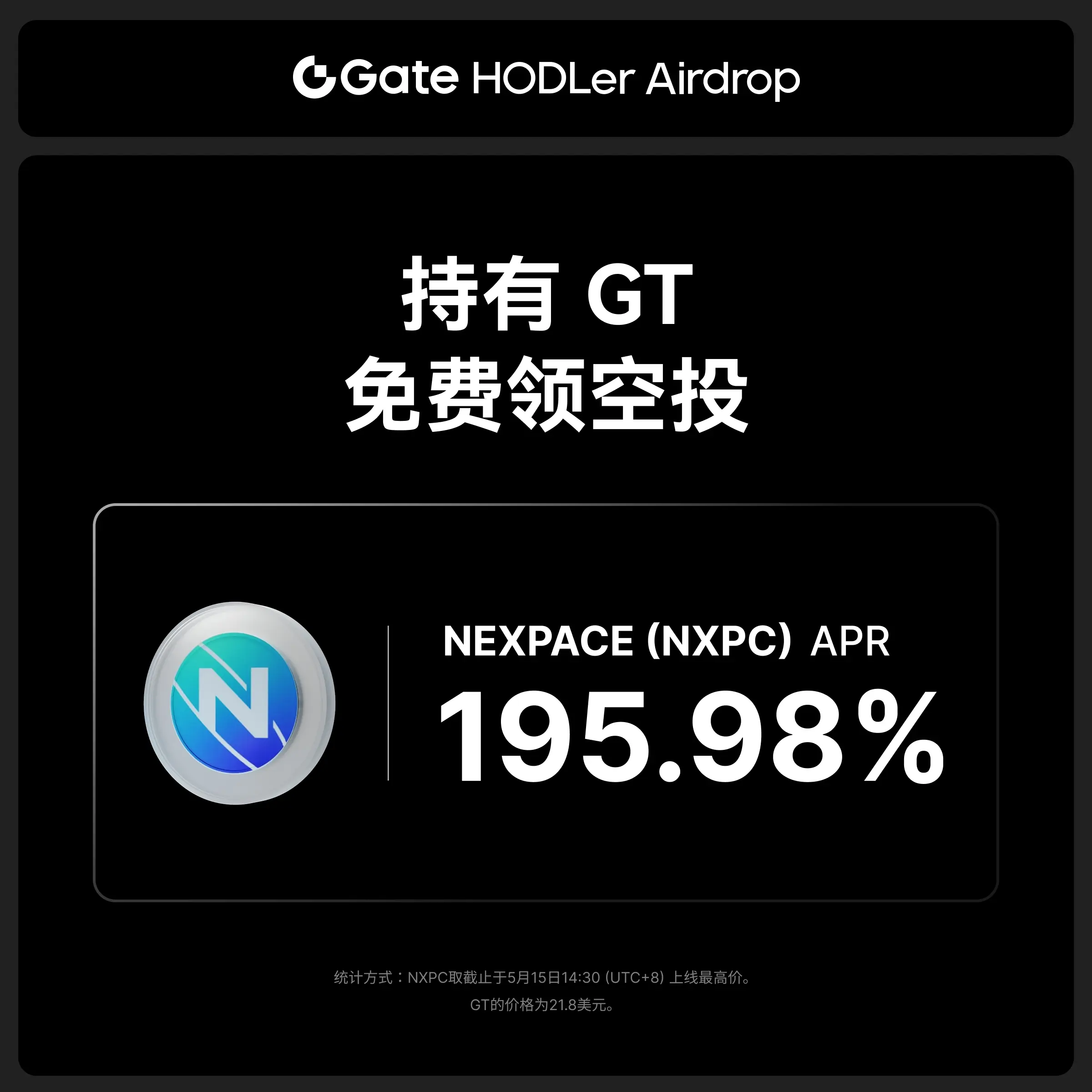- 置顶
- 🍕一年一度的比特币披萨节即将到来,带 #比特币披萨节# 话题发帖,瓜分 $500 奖池 + 精美周边!
📅活动时间:2025/5/16 16:00 - 2025/5/23 24:00 (UTC+8)
🎯【参与方式】
在活动期间,带上 #比特币披萨节# 话题参与每日发帖打卡,内容方向不限(例如👇):
🔹 纪念类:回顾“1万BTC换披萨”的故事,分享你与BTC的记忆
🔹 交易类:分享BTC交易经历、行情见解、晒出BTC合约收益率等
🔹 展望类:畅想比特币未来、价格预测
🔹 创意类:披萨梗、段子、表情包、图文混搭等
马上发帖:https://www.gate.io/post
优质内容 + 高互动,有机会拿下大奖!
🎁【活动奖励】
1️⃣ 披萨节发帖明星奖(根据内容质量 + 点赞评论互动量 + 发帖频率综合评选)
第一名:茶具套装 + $50手续费返现券
第二名:运动速干套装 + $30手续费返现券
第三名:定制文化衫 + $20手续费返现券
2️⃣ 披萨节幸运星奖
每日打卡发帖,随机抽取20位幸运用户,每人 $10 手续费返现券
注意:
明星奖需在活动期间发帖量≥7,平均每条贴文互动量(点赞+评论)≥5;
幸运星奖需在活动期间发帖量≥3,平均每条贴文互动量(点赞+评论)≥2;
发帖时带上正确话题标签 #比特币披萨节# 且不能带额外标签,帖子才视为有效;
如周边奖励因物流原因
- 🎊 12周年惊喜礼遇不停歇
三重福利齐上阵:抽周边、送祝福、玩游戏拿好礼!
📍立即参与,100%领取专属周年礼包:https://www.gate.io/activities/12th-anniversary?pid=APP&ch=s9ZCIeg6
第4期限时狂欢派对开玩,登录即送游戏机会
找到周年专属蛋糕赢 iPhone 16 Pro、MacBook Air等豪礼
活动详情:https://www.gate.io/announcements/article/44624
#Gateio12Years#
- 300,000 枚 #NXPC# 已通过 #HODLerAirdrop# 空投发放,年化收益率高达195.98%!
持有 1 枚 $GT?你已获得0.215美元!
持有 1,000 枚 $GT?你已获得215美元!
持仓越多,奖励越高!
$60,000 空投仍在进行中 👉 https://www.gate.io/hodler-airdrop
- 🎉 关注有奖!Gate_Activity 正式上线!
💰 关注 Gate_Activity,瓜分 $50 点卡奖励!机会不容错过!
10 关注者* $5 点卡
参与方式:
1️⃣ 关注 Gate_Activity 👉 https://www.gate.io/profile/Gate_Activity
2️⃣ 点赞本条动态
📅 截止时间: 5月17日 18:00(UTC+8)
即刻关注,不错过精彩活动!
- 📢 Gate.io动态大使正在火热招募中!
还不知道如何参加成为动态大使?
查看下图 👇️
🎁 成为动态大使,解锁专属特权,享受专属周边福利!
- 专属福利任务
- 精美周边
- 粉丝专属红包支持
- 动态VIP5、黄V特权
- 每月荣誉大使评选
赶快点击报名链接参与 ➡️ https://www.gate.io/questionnaire/4937
更多:https://www.gate.io/announcements/article/38592
BEP20代币开发完整教学
引言
在区块链技术快速发展的今天,BEP20代币已成为币安智能链上不可或缺的重要组成部分。无论您是刚接触区块链的新手,还是想要深入了解BSC代币发行流程的开发者,掌握BEP20代币的相关知识都至关重要。本文将为您详细介绍BEP20代币的基础知识,并提供实用的币安智能链挖矿教程。
BEP20代币:区块链新手必学的入门知识
币安智能链BEP20代币已成为区块链领域的重要组成部分。作为新手,了解BEP20代币的基本知识至关重要。BEP20是币安智能链(BSC)上的代币标准,类似于以太坊的ERC20标准。它定义了代币在BSC上的使用规则,为开发者提供了灵活的代币发行格式。
BEP20代币具有多项优势。首先,它与币安链的BEP2和以太坊的ERC20标准兼容,这大大增加了代币的跨链互操作性。其次,BEP20代币的转账速度快、手续费低,这得益于币安智能链的高效性能。根据数据显示,币安智能链转帐手续费平均仅为0.1美元左右,远低于以太坊网络。
对于想要深入了解BEP20代币的新手,可以参考币安智能链挖矿教程。这些教程通常会详细介绍如何在BSC上进行挖矿操作,帮助新手快速上手。同时,选择合适的BEP20钱包也是至关重要的一步。市面上有多种BEP20钱包可供选择,如MetaMask、Trust Wallet等,新手可以根据自己的需求进行选择。
如何在币安智能链上快速发行自己的代币
在币安智能链上发行BEP20代币已成为许多项目方的选择。BSC代币发行流程相对简单,即使是技术基础较弱的新手也能够轻松上手。以下是发行BEP20代币的基本步骤:
首先,开发者需要准备好智能合约代码。可以使用Solidity语言编写,也可以直接使用OpenZeppelin等开源库提供的模板。其次,需要在币安智能链上部署合约。这一步骤可以通过Remix等在线IDE完成,也可以使用Truffle等开发框架。
部署合约时需要支付少量BNB作为手续费。根据统计,部署一个标准的BEP20代币合约平均需要花费约0.1-0.3 BNB。完成部署后,代币就正式发行了。开发者可以通过合约函数进行代币铸造、转账等操作。
值得注意的是,BEP20代币的发行过程中需要注意安全性。建议在正式发布前进行充分的测试和审计,以确保合约代码没有漏洞。同时,也要注意遵守相关法律法规,避免触犯法律红线。
避开空投诈骗陷阱:BEP20代币开发安全指南
随着BEP20代币的普及,相关的诈骗行为也层出不穷,其中空投诈骗尤为常见。为了帮助新手避免陷入陷阱,以下提供一些BEP20空投教学和安全建议:
首先,警惕要求预先支付费用的空投活动。正常的空投通常不需要用户支付任何费用。其次,谨慎对待要求提供私钥或助记词的空投。合法的空投活动绝不会要求用户提供这些敏感信息。
再者,对于声称能够获得巨额回报的空投要保持警惕。根据统计,正常的空投活动平均每个地址获得的代币价值通常在10-100美元之间。如果有项目声称能够获得远超这个范围的回报,很可能是骗局。
对于开发者来说,在进行BEP20代币开发时也需要注意安全问题。建议使用经过审计的合约模板,避免引入不必要的安全漏洞。同时,在发布代币前最好进行专业的安全审计,以确保合约代码的安全性。
此外,开发者还应该注意保护好自己的私钥和部署权限。据统计,超过60%的代币诈骗案例是由于开发者的私钥泄露或权限被盗造成的。因此,妥善保管私钥和权限是确保代币安全的关键。
总之,无论是参与空投还是开发BEP20代币,安全永远是首要考虑的因素。通过学习相关知识,提高警惕性,可以有效避免陷入各种陷阱,确保在币安智能链生态中安全、顺利地进行各种操作。
结论
BEP20代币凭借其低手续费、高效率的特点,为区块链新手提供了理想的入门选择。透过掌握正确的发行流程和安全准则,开发者能够以较低成本在币安智能链上部署代币。面对层出不穷的空投诈骗,谨记切勿提供私钥资讯,警惕过高回报承诺,妥善保管开发权限,方能在BSC生态中稳健发展。
风险提示:代币发行存在合约安全漏洞风险,且市场波动可能导致代币价值大幅下跌,投资前务必谨慎评估。